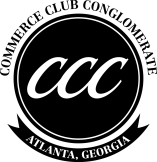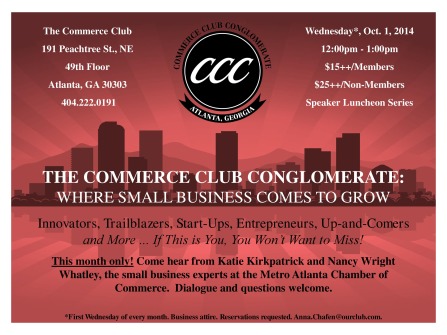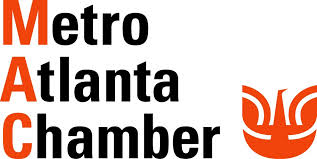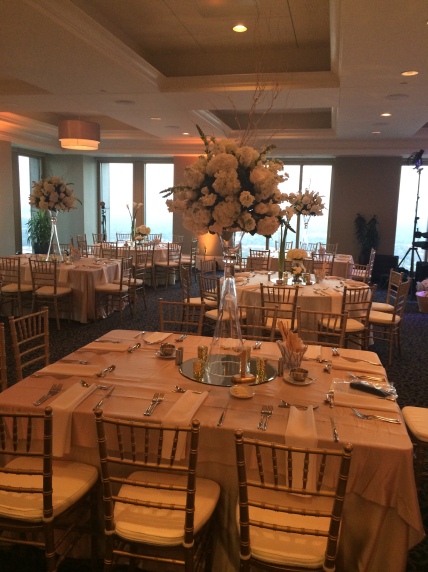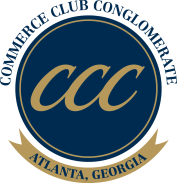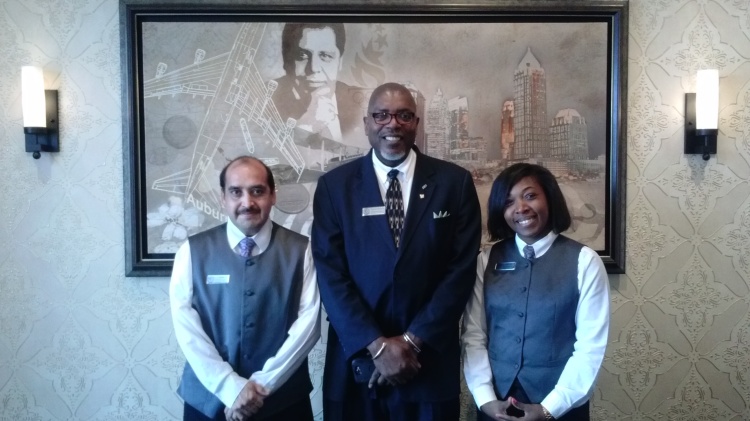
2014’s Row for Freedom: Crossing an Ocean in Search of Hope by Julia Immonen
“I’m ashamed to say that I was more into shoes and handbags, into me, myself and I, than others.” So lamented Julia Immonen to an audience of Commerce Club members and guests at their recent “Row for Freedom: Crossing an Ocean in Search of Hope” event, held to raise awareness about the fastest growing crime in the world, the trafficking of human beings.
“I grew up in an ordinary home. Charitable things, helping others, were not on my radar,” she confessed. Not on her radar, that is, until she saw the 2008 movie Taken. Not realizing the movie was based on a true story, Inman stated she still left the theater feeling stunned. Later, when she found out the horrifying truth, that slavery, with 27 million currently in bondage around the world, is indeed alive and well, she knew she had to do something.
The idea, to do something to tell the whole world about modern-day trafficking, to assist in seeing the end of slavery in her lifetime, was spawned. When a friend joked that that “something” should be to row across the entire Atlantic Ocean, a feat that is considered to be the world’s toughest rowing race, she conceded.
“I signed up to do it as if I were agreeing to go have coffee at Starbucks with some girlfriends,” the curly headed blond, who had no prior rowing experience, joked to her audience.
Not long after assembling a team of young women to accompany her on the seven meter boat for the proposed feat, the sobering reality sank in that their journey would be anything but a joke.
She proudly pointed out, “More people have been to outer space than have rowed the Atlantic!”
Even the trip’s planning process was intense. In preparation, each of the women added about 14-15 pounds of muscle; signed up for rowing classes at their local gyms; took crash courses in astrology (to learn how to navigate the open seas using only the sun, moon and stars as guidance); and made six weeks’ worth of daily food packages, each containing the calories that would be needed to replenish the eight to 10 thousand that would be burned individually each day.
Despite the attention to detail in advance, Immonen stated that nothing on earth could have prepared her for the mental battle that lay ahead.
“I cried for the first ten days. It just took your breath away.”
Another rower was seasick for 30 of the 45 days that the journey lasted. And each felt ill-equipped for the tasks at hand – the never-ending rowing (the women were on a continuous cycle of “row for two hours, sleep for two hours”), hand pumping water to drink, overcoming technical difficulties (“anything that could break, broke”), and, finally, coping with the loss of approximately one-third of their food supply when, early in the journey, the boat tipped on its edge and many of its contents, including the food packages, were lost to the sea.
Each time she felt like giving up to despair, Immonen would pull from strength she did not previously know that she had, strength from deep inside, to keep her hope alive.
“We had to realize the setbacks will come. The challenges. I felt ill-equipped. But sheer grit – attitude mixed with a lot of passion – these things got me through. Sometimes a shooting star at night would just keep you going.”
Other times, focusing on the enormous responsibility she had to the men, women, and children for whom she rowed was drive enough to force her to continue the daunting task.
“At some point I realized I have the freedom to get off of this boat [when we land] in Barbados, if I choose. My pain paled in significance [to those in slavery].”
Get off the boat she did. With legs wobbling, unable to support her own body’s weight after so many weeks aboard the small craft, Immonen, and the other heroic women, landed on the coast of Barbados, 45 days after having set sail from Canaries, crying, sobbing and celebrating, as they embraced their friends and loved ones.
“I was absolutely over the moon,” she remembered. “It took a few days for it to sink in what we’d actually achieved.”
That achievement, not only to set what now stands as a Guinness Book World Record, but, most importantly, to capture the attention of the world’s media (who, in turn, pressure our nations’ policy makers), shot human trafficking to the forefront of many minds and to the top of many headlines.
With all of the news coverage, the conversation, one that is certainly nothing new (remarkably, a book was published in 1910 titled “Stop the Trafficking of Our Girls”), began to change.
What had once been the unsexy, unpopular topic – awkward and avoided, talked about very little, if at all – burst forth onto the public scene after the much publicized row for freedom. From all corners of the globe, facts and statistics began pouring forth:
- Human trafficking is, first and foremost, a business of supply and demand.
- One child forced to beg earns a human trafficker an average of $100,000 per year.
- One underage girl forced into sex trafficking can earn her pimp an average of $33,000 per week.
- Trafficking has become a 150 billion dollar global industry. That is more than the US banking system, Google, and big oil are worth combined.
Sobering statistics, especially when we realize they affect where each of us lives and works every day.
“I bring the global perspective,” continued Immonen. “It’s on our doorsteps in the UK. October 18 is now anti-slavery day. It’s becoming something more people talk about globally.”
People are talking about it, the trafficking of living human beings for profit, not just internationally, but at home as well.
Did you know that trafficking can look like a lot of different things, for instance? Sex trafficking resonates with a lot of women, reiterated Cheryl DeLuca Johnson, President and CEO of Georgia’s non-profit StreetGrace, which works closely with the State to bring an end to Domestic Minor Sex Trafficking (DMST) and who presented along with Immonen, but it can look very different, too. It can be as simple as our state’s agriculture laborers. Many of the supply chains of our leading supermarkets are littered with slavery.
As with most things which we desire to change, Johnson explained, we must begin with awareness. Until we face the facts, we cannot move forward.
Did you know?
- In Georgia alone, 290 million dollars will be spent on sex trafficking.
- 7,200 men per month will knowingly or unknowingly purchase an underage child in Georgia.
- 42% of these purchases will be made north of the Perimeter.
Dwelling on these numbers can seem overwhelming and discouraging. However, Johnson urged the audience to take them all in. If we could change just our one city, she pointed out, we would affect the global demand.
“If you don’t know what’s happening, you can’t do anything to change it. And,” she continued, quoting the Dalai Lama, “if you think you’re too small to make a difference, try sleeping with a mosquito!”
“We are trying to change the thinking of an entire society. These numbers will not change until the demand is gone. We need to get the men involved if we are to end this,” reminded Johnson frankly. “We must build a culture that respects women and children.”
Each of us can begin doing this right where we are. Like Immonen, whose boldness and braveness ultimately landed her a place as a World Record holder, a torch bearer in the 2012 Olympic Games, and a published author, we must simply be willing to take a stand.
“Do whatever you’re good at, for freedom,” she urged her audience in closing. “A group of stay-at-home moms baked cupcakes and raised 16,000 European pounds! I’m willing to do whatever it takes, literally even give my life to stop human trafficking. I’m so glad my life is on a different path. It has purpose and meaning now.”
What will you do for freedom?












